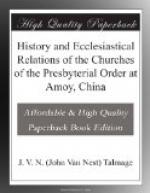How dreadful! English Presbyterians call the body at Amoy a Presbytery, and American Dutchmen call it a Classis! If this language is also meant to imply that the Classis at Amoy is usurping authority, it is answered in other parts of this paper.
The next “particular” of the Committee is:
“2d. The Missionaries, while they are members of this Grand Presbyterial or Classical Council, exercising full ministerial functions in it, are, at the same time, members either of Classes in America, or of Presbyteries in Great Britain.”
The meaning of this second “particular” is, that the Missionaries have a two-fold ecclesiastical relation. Is there anything contrary to Scripture doctrine, or to Presbyterian principles, or to common sense, that ecclesiastical relations should correspond to fact?—that the Missionaries should have some sort of an ecclesiastical relation, both to the Church at home and to the Church in China? They have a peculiar relationship to both these Churches. Why forget or ignore the fact that they are Evangelists and not Pastors? Why object to an ecclesiastical relationship exactly corresponding to, and required by, their office and position? The two parts of this relationship do not contradict each other. They are altogether correlative. The Missionaries are still agents of the Church which sent them out. Their ecclesiastical relation to it should be direct, that they may be controlled by it, independent of any intermediate body. The Church at home cannot afford to cut off her Missionaries from this immediate relationship so long as they remain her agents. This does not conflict with, but requires some sort of a corresponding relationship to the Churches planted and growing up through their instrumentality. Their relationship to those Churches must have reference especially to local matters, for the proper organization, and control, and development of the native churches, not at all to be controlled by them. When they cease to be agents of the Church at home, and become the proper pastors of the native churches, then will be the proper time to put themselves under the control of the native churches, instead of the Church at home. We must not confound evangelization with colonization. Does any one imagine that Paul and Barnabas, and Timothy and Titus, or any of them (for they were not all apostles), had connection with the Church which sent them out, only through the churches and ecclesiastical bodies organized by them? or that they were in any sense under the control of those bodies?
The next and last “particular” of the Committee is “3d. That while the Churches, three at least, are organized under and according to the Constitution of our Church, it is, nevertheless, claimed that the members of said Churches are not more members of the Reformed Dutch Church here, than they are members of the Presbyterian Church of England.”




